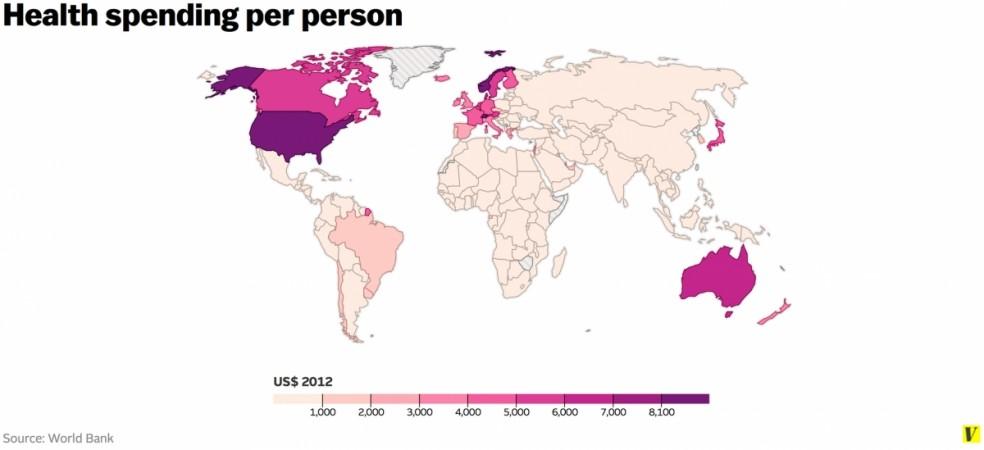![ZMapp is a serum that seems to have cured two US health workers of the Ebola virus [representational image] Ebola cure](https://data1.ibtimes.co.in/en/full/530907/ebola-cure.jpg?h=450&l=50&t=40)
When American missionary worker Dr Kent Brantly discovered that he contracted Ebola virus while treating patients in Liberia, he was completely devastated. He even called up his wife Amber to say goodbye.
However, when all hope seemed lost, there appeared one silver lining. A San Diego-based firm, named Mapp Biopharmaceutical Inc - which has been working on creating a cure for Ebola for the past few years, finally found some success.
They even tested the drug on monkeys and chimpanzees, and found that it cured them from the deadly virus. But the drug has never been tested on a human being before. It was never been used for clinical trials, and its side effects on humans are, as of yet, unknown.
However, Brantly, whose health has been deteriorating, decided to risk it and gave his consent for the drug to be administered on him.
The doctor started feeling better within an hour of the drug being administered, and was immediately flown back from Liberia's capital Monrovia to Atlanta. Most of his symptoms have disappeared within an hour of taking the drug. Even the severe rashes he had are almost gone.
The drug seems to have cured Brantly of the virus. He has even advised his colleague Nancy Writebol, who had also been inflicted with the virus, to take the drug. After receiving the serum, Writebol has also been cleared to be flown into the US, and is now all set to join Brantly.
The serum, developed by Mapp Biopharmaceutical Inc, is known as ZMapp, and it seems that this drug has cured both health workers. The serum is derived from the antibodies generated in mice, according to CNN.
Three mice were exposed to fragments of the Ebola virus. These mice were seen to have created their own immune response to the virus. Thus, the scientists extracted the antibodies from the mice, and used them as drugs to cure the experimental monkeys of Ebola. The same serum was used to treat Dr Brantly and Writebol.
Why only the two US citizens got the drug and not the hundreds in Africa?
Though the Ebola virus has claimed 887 lives since February, the World Health Organization seems to be completely against the use of this drug. They seem to believe that the doctors in West Africa "cannot start using untested drugs in the middle of an outbreak, for various reasons".
Then how exactly did the two US health workers get the drug? Well, the whole process seems to be pretty unclear but the WHO seems to be playing "pass the buck" here, and sources say that they might have gotten the drug under the "compassionate use" section of the US Food and Drug Administration. However, this is still really strange as the two health workers did not even receive the drug on US soil.
We are all happy that the two Americans have been cured of the disease, and also that the drug seems to be working against Ebola. But will it be available to the hundreds of inflicted ones in West Africa soon?
It does not seem so at the moment. First of all, WHO seems to be insisting on further trials, before using the drug as a mass cure. Also, many experts seem to believe that a vaccine would be more effective and less harmful to the patients, in cases like the Ebola virus, rather than just administering antibodies from other animals.
However, the most important issue at play here seems to be the fact that Mapp Biopharmaceutical has not created enough serum to be used on a mass scale.
"Apparently the company is trying to scale up, (but) it's not easy to scale up to very large number of doses," said Dr Anthony Fauci, director, National Institute of Allergy and Infectious Diseases.
According to a global report, published by the WHO themselves, in 2012 "the world's poor are not reaping the full benefits of research outcomes, despite an increasing global commitment to health research".

In other words, the companies are not so eager to find cures for diseases that are more prevalent in African countries, where the average per capita health expenditure is less than $100 per annum, as compared to the US, where the average per capita health spending exceeds $8,000.
Also, there have been reports that Ebola virus has the potential to be weaponized. This is the sector, where Ebola might be attracting more investment and research.
One can only hope that ZMapp can be quickly cleared to treat the people in West Africa. After all, it has been nearly 38 years (1976) since the first Ebola breakout was registered, and in around four decades, the researchers seem to have only extracted a serum from three mice.

















